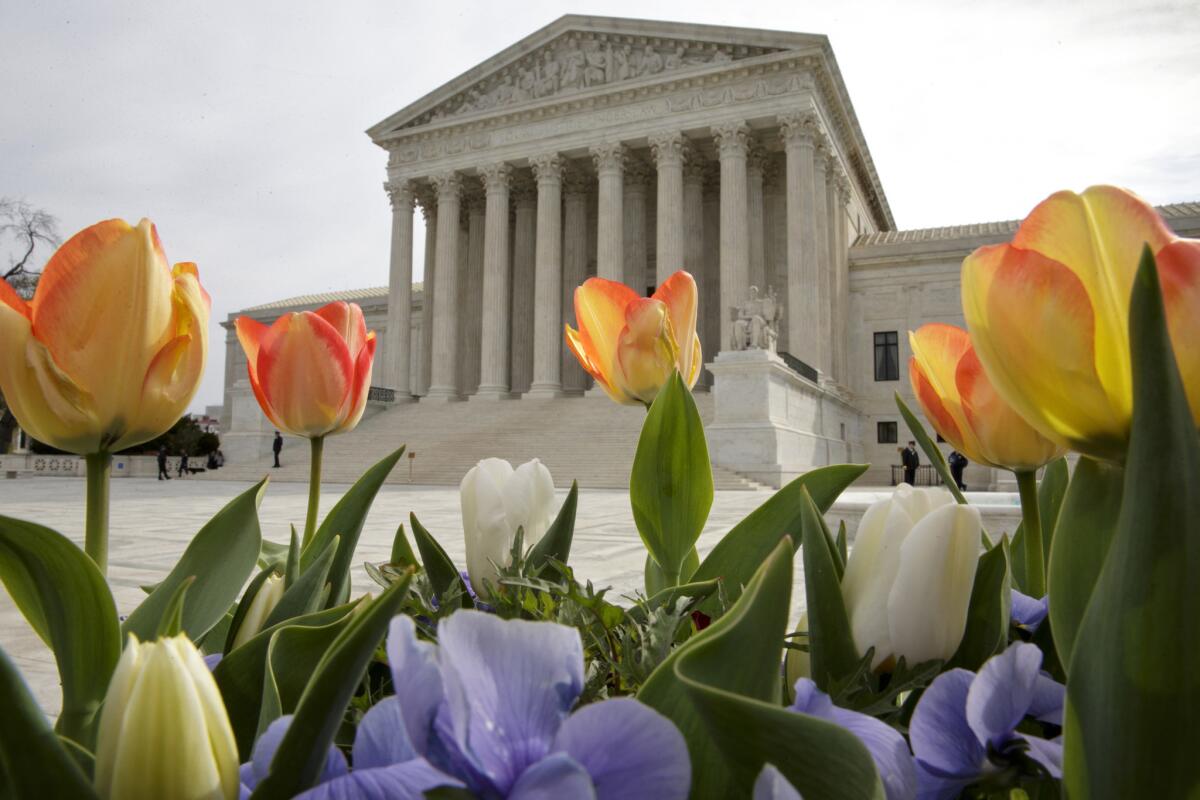Supreme Court conservatives rule for Wisconsin GOP, reject more time to submit mail-in ballots

- Share via
WASHINGTON — The Supreme Court’s five Republican appointees came to the aid of Wisconsin’s Republican leaders Monday and blocked a judge’s order that would have given voters an extra week to submit their ballots by mail.
By a 5-4 vote, the justices granted an emergency appeal from Republican lawyers on the eve of Tuesday’s election.
In an unsigned opinion, the court’s five conservatives said a federal judge had gone too far by extending the time for counting absentee ballots. Justice Ruth Bader Ginsburg, joined by the other Democratic appointees, dissented.
The high court’s order came at the end of the day in which Wisconsin Gov. Tony Evers, a Democrat, moved to postpone the election because of the danger to poll workers and voters, only to be overruled by the state’s conservative Supreme Court.
Wisconsin, a closely divided battleground, is the first state to hold major elections under the threat of the coronavirus. And its legal scramble over voting deadlines may foreshadow what’s to come this fall if the virus remains a daily threat.
“It is a very bad sign for November that the court could not come together and find some form of compromise here in the midst of a global pandemic unlike anything we have seen in our lifetimes,” said UC Irvine law professor Richard Hasen, an election law expert. “Like the Wisconsin Supreme Court, the U.S. Supreme Court divided along partisan and ideological lines.”
The GOP leaders filed their emergency appeal with Justice Brett M. Kavanaugh, and he referred it to the full court.
The court issued a “per curiam” order, which speaks for the court, although in this instance, only five justices.
“Extending the date by which ballots may be cast by voters — not just received by the municipal clerks but cast by voters — for an additional six days after the scheduled election day fundamentally alters the nature of the election,” they said. “By changing the election rules so close to the election date and by affording relief that the plaintiffs themselves did not ask for in their preliminary injunction motions, the district court contravened this court’s precedents and erred by ordering such relief. This court has repeatedly emphasized that lower federal courts should ordinarily not alter the election rules on the eve of an election.”
In dissent, Ginsburg said the majority failed to take into account the emergency presented by the pandemic.
“While I do not doubt the good faith of my colleagues, the court’s order, I fear, will result in massive disenfranchisement. A voter cannot deliver for postmarking a ballot she has not received. Yet tens of thousands of voters who timely requested ballots are unlikely to receive them by April 7,” she wrote. “This court’s intervention is thus ill advised, especially so at this late hour.”
Republicans who control the state Legislature refused to postpone Tuesday’s election, which includes a high-profile reelection fight over a conservative justice on the state Supreme Court.
Last week, Wisconsin’s governor issued a stay-at-home order, and Democratic lawyers then went to court seeking to postpone the election or allow more time for voters to receive and submit absentee ballots. At least 27,000 voters would not receive their absentee ballot by Tuesday, according to the Wisconsin Election Commission.
U.S. District Judge William Conley refused to postpone the April 7 election, but he ordered the state to count mail-in ballots if they arrived by April 13.
GOP leaders tried but failed to win a reversal from the U.S. 7th Circuit Court of Appeals in Chicago. They then filed an emergency appeal at the Supreme Court and urged the justices to reject the extended time for accepting mail-in ballots. They said the judge’s orders “means that tens of thousands of Wisconsin residents will be permitted to vote after the election-day deadline.” This creates a “serious possibility of fraud and misconduct.”
Lawyers for the Democratic National Committee urged the court to stand back and to deny the GOP appeal. They said they had urged state leaders to postpone the election because neither poll workers nor voters would want to gather to cast ballots at a polling place.
While they endorsed the idea of more voting by mail, “it quickly became apparent that thousands, if not tens of thousands of voters, would not even receive their timely requested absentee ballots until on or after April 7.” They said they supported the judge’s decision to extend the deadline for the state to accept otherwise valid absentee ballots.
More to Read
Get the L.A. Times Politics newsletter
Deeply reported insights into legislation, politics and policy from Sacramento, Washington and beyond. In your inbox three times per week.
You may occasionally receive promotional content from the Los Angeles Times.











